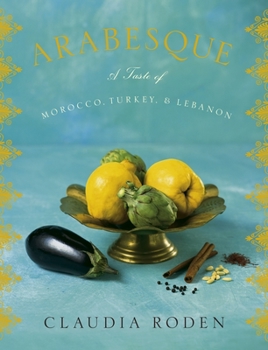Arabesque: A Taste of Morocco, Turkey, and Lebanon: A Cookbook
Select Format
Select Condition 
Book Overview
Morocco, Turkey, and Lebanon offer some of the world's most exciting cuisines. In this delectable cookbook, the award-winning, bestselling author of The Book of Jewish Cooking and Claudia Roden's Mediterranean translates the subtle play of flavors and cooking techniques to our own home kitchens. Interweaving history, stories, and her own observations, she gives us 150 of the most delicious recipes: some of them new discoveries, some reworkings of classic dishes--all of them made even more accessible and delicious for today's home cook. From Morocco, the most exquisite and refined cuisine of North Africa: couscous dishes; multilayered pies; delicately flavored tagines; ways of marrying meat, poultry, or fish with fruit to create extraordinary combinations of spicy, savory, and sweet. From Turkey, a highly sophisticated cuisine that dates back to the Ottoman Empire yet reflects many new influences today: a delicious array of kebabs, fillo pies, eggplant dishes in many guises, bulgur and chickpea salads, stuffed grape leaves and peppers, and sweet puddings. From Lebanon, a cuisine of great diversity: a wide variety of mezze (those tempting appetizers that can make a meal all on their own); dishes featuring sun-drenched Middle Eastern vegetables and dried legumes; and national specialties such as kibbeh, meatballs with pine nuts, and lamb shanks with yogurt.
Format:Hardcover
Language:English
ISBN:030726498X
ISBN13:9780307264985
Release Date:October 2006
Publisher:Knopf Publishing Group
Length:352 Pages
Weight:2.85 lbs.
Dimensions:1.2" x 7.7" x 9.9"
Customer Reviews
4 ratings
Yum
Published by Thriftbooks.com User , 17 years ago
Roden presents Middle Eastern and Mediterranean cuisines with delicious results. The recipes are clear, easy and just plain good. Try the zucchini fritters "kabak mucveri," the roast shoulder of lamb with couscous and date stuffing "dala m'aamra bi keskou wa tmar" or prawns in spicy tomato sauce "kimroun bil tamatem." A glossary would have been a good addition and the book's organization by country is a bit awkward, but the index is thorough and broken down by ingredients. For the cook interested in this food genre, I would also refer them to books by Wolfert and Heiou, as well as Roden's previous writings. A terrific addition to any cook's library.
More great recipes
Published by Thriftbooks.com User , 17 years ago
One expects the best from Claudia Roden, and this book does not disappoint. Some of us remember how her "Book of Middle Eastern Food" burst like a great white light on the culinary scene, way back in 1968. (There is now an even better second edition, 2000.) The present book recycles some recipes from earlier works, but focuses on three particularly good areas, and has absolutely top-flight recipes from them, sparing you the problem of wading through a vast mass of text. Just a couple of quick supplemental comments from some experience: First, there is one bad thing about this book: Ms. Roden's tolerance for bouillon cubes. Their metallic, rancid-grease taste ruins Middle Eastern food. Use homemade stock or just omit. Second, Turkish food isn't "Arab," it really does depend heavily on Turkic roots, plus Greek and Persian influences--only a few Arab ones. And the publishers have badly served the Turkish section by using dotted i's for undotted ones. These write different sounds: the dotted i is the "ee" sound, the undotted is approximately the "uh" sound. This could cause confusion if you ask for ingredients or dishes. One more note on Turkey: For Turkish food, especially the salads, you have to use not just extra virgin olive oil, but Turkish extra virgin oil, or something very similar (Lebanese or the finest Kalamata or Italian). Yep, it costs, so much so that one dish is named "The Imam Fainted" because--according to one story--he found out the cost of the oil in the dish (p. 168)! Finally, Ms. Roden notes that argan oil, a wonderful if obscure oil from southern Morocco, is regarded as "aphrodisiac." Actually, a mixture of argan oil, honey, and ground almonds is called "Moroccan Viagra" in that part of the world. The reality behind this seems to be the combination of sugar for quick energy and protein plus easily digestible, nourishing oil for stamina. It's also used for kids, to make them grow better, and no one thinks it will turn them into sex demons, so we're talking nutrition here, not lust per se. Turkey has an equivalent: lukum candy made from grape juice and walnuts ("Turkish Viagra"--according to Istanbul market men).
A Beauty of a Cookbook
Published by Thriftbooks.com User , 18 years ago
I loved this even before I tried one of the recipes - it is truly a lovely book and a joy just to page through. This is my first Roden cookbook so perhaps I'm not as disappointed as some who feel some of the material has been presented before. I like to learn more about food than just how to prepare it, so welcomed her stories about the origins and significance of recipes and ingredients. As a "regular joe" kind of cook, it pleases me that many of the recipes are accessible to me. But those with a higher level of kitchen skill should enjoy it, too. This would be a wonderful gift book for a friend who loves food and world cultures.
Wow, what a beauty!
Published by Thriftbooks.com User , 18 years ago
I am a big fan of Claudia Roden, and have been collecting her cookbooks for years. This one beat all my expectations. It is beautifully photographed and the recipes are great. One thing I love about her books is that she tells you history of the dishes and makes you feel like you are learning about a culture. I really like the format where it is split into seperate sections for each county. This is one book I look forward to using again and again!





